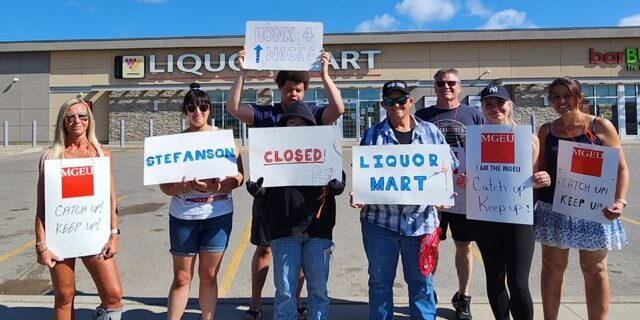Public sector bargaining in Manitoba is being stifled by a restrictive wage mandate imposed by Premier Heather Stephenson and her government, according to the Manitoba Government and General Employees Union (MGEU).
Liquor workers employed by Manitoba Liquor and Lotteries (MBLL), who are represented by the MGEU, started strike action on August 8, citing wages as a significant issue at the bargaining table. At the moment, MBLL has only offered a two per cent wage increase per year.
“Here’s what we’re hearing at the MBLL bargaining table and at other major tables – this is all we can offer,” said MGEU president, Kyle Ross, in a bargaining update on the union website. “What is clear is that Heather Stefanson and cabinet are calling the shots here.”
The evidence of the wage mandate is also evident at the bargaining table for workers at Manitoba Public Insurance (MPI). MGEU said the final offer from MPI was also two per cent.
While provincial workers struggle to keep up with the cost of living, MGEU says that the Manitoba government is trying to shirk responsibility for the low wage offers.
“The Stefanson Government wants Manitobans to believe that there is no provincial wage mandate, that they are not involved in public sector negotiations,” MGEU wrote on their website. “James Teitsma, the Minister Responsible for the Manitoba Public Service, said in a media interview that the government is ‘hands off’ with respect to negotiations at crown corporations and other public sector employers.”
However, a letter to MGEU members working at MPI goes against this claim. The letter from then Minister of Finance Scott Fielding and Minister Jeff Wharton said that setting broad monetary mandates for employers within the public sector is within the government’s traditional role.
Adding insult to injury, the wage mandate imposed on public sector workers is not being enforced fairly. The Stefanson government reached a tentative agreement with doctors that included an 18 per cent increase over four years. At the same time, Stephenson and her cabinet ministers accepted a 3.3 per cent wage increase.
“It’s become clear that the Stefanson Government’s wage mandate is flexible. But only for some folks. Folks like the Premier, Cabinet, doctors and typically those making six figures. For front line workers, 2 percent is as good as it gets,” Ross said on the union website.
The wage mandate being imposed could end up being very harmful to frontline public services. MGEU said that the two per cent wage increase is falling short of wages offered at grocery stores such as Walmart and Sobeys. The lagging wages mean that it is harder and harder to retain liquor workers.
Liquor workers have returned to the bargaining table with MBLL but have not accepted a recommendation for binding arbitration. At MPI, workers have “overwhelmingly” voted in favour of a strike in light of the lacking wage offer.
It seems as though job action will persist in Manitoba until the wage mandate is lifted.
“No one wants to go on strike. These are people’s livelihoods we’re talking about here,” Ross said. “But sometimes we have to take a stand. No matter who you are, or where you work, your wages aren’t going as far as they used to and you deserve a fair increase. Those in power are not the ones falling behind here. It’s working Manitobans, those on the front-lines of serving our communities. Right now, our members are standing together, doing their best to make sure fairness prevails.”



